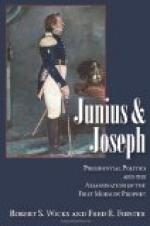Angel went on. “I would have thee teach the child above all things the unspeakable wretchedness of sin, for the least sin closes the eye of the soul by which we see God and the things of God, clogs them with the dust and dirt of the world; and when there is no more any clear vision, selfishness is mistaken for love, malice for righteousness, and folly for truth. So I pray thee, dear heart, be wary, and slay within thyself the evil nature, for though I cannot see it, perchance God does; and teach the child above all things from the first to fear sin more than death.”
“You shall teach him, Angel.”
“Dear heart, I would not lay upon thee the burden of knowledge of coming sorrow if I dared to withhold it, but I believe, Susannah, that it will soon be given to me to die for the truth and for our people.” After a moment’s pause he went on, and his tone, which had dropped involuntarily, became again cheerful. “That is why I have to-day determined to change the plan that we have made and to send thee and the child to-morrow with the company who are about to travel to Far West, where the prophet is now dwelling with his wife, for I know he will never see thee want.”
Susannah rose up. In the dusk of the low, small room her figure, the child still in her arms, seemed to tower like a misty goddess or Madonna, such as praying men have often seen appearing for their succour; her voice came clear and strong from a heaving breast.
“Angel, I will never leave you, never,” and then she added in a voice that faltered, “Send the child if you will.”
CHAPTER X.
They did not send the child to Far West, or even insist on Elvira seeking safety there, because that town also became swiftly involved in the flames of the war which had flashed into new life at the Gallatin fight. The whole land was full of threats and terrors, and many open fights at the polling-booths were soon reported. The Mormons and anti-Mormons in various localities entered into mutual bonds to keep the peace, but in many cases these bonds were soon broken.
To the Mormons everywhere had been issued a proclamation, signed by Smith and the elders, commanding that no official tyranny, however unjust, was to be resisted. “Let every soul be subject unto the higher powers.” “Submit yourselves to every ordinance of man for the Lord’s sake.” But when private violence was offered the order was that the men should fight in defence of their families.
It seems to have been this order to fight, and the fact that the Mormons proved themselves sturdy fighters, which alone caused any of the Gentiles to enter into a compact of peace. So mad was their anger against a sect claiming the land as an inheritance from God and voting to a man in obedience to its leader, that the Missouri journals of the day openly taught that to kill a Mormon was no worse than to kill an Indian, and to kill an Indian was tacitly considered as meritorious as killing a wild beast.




